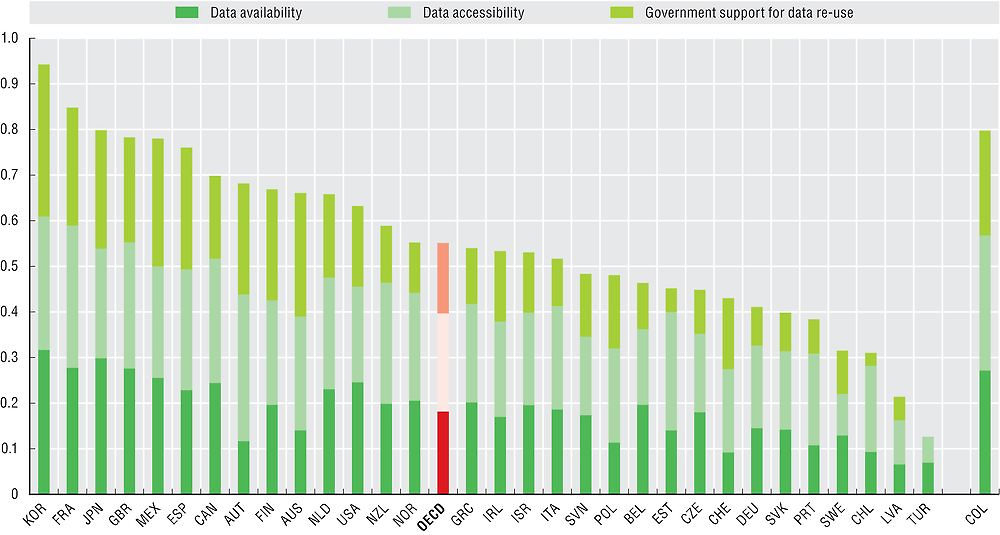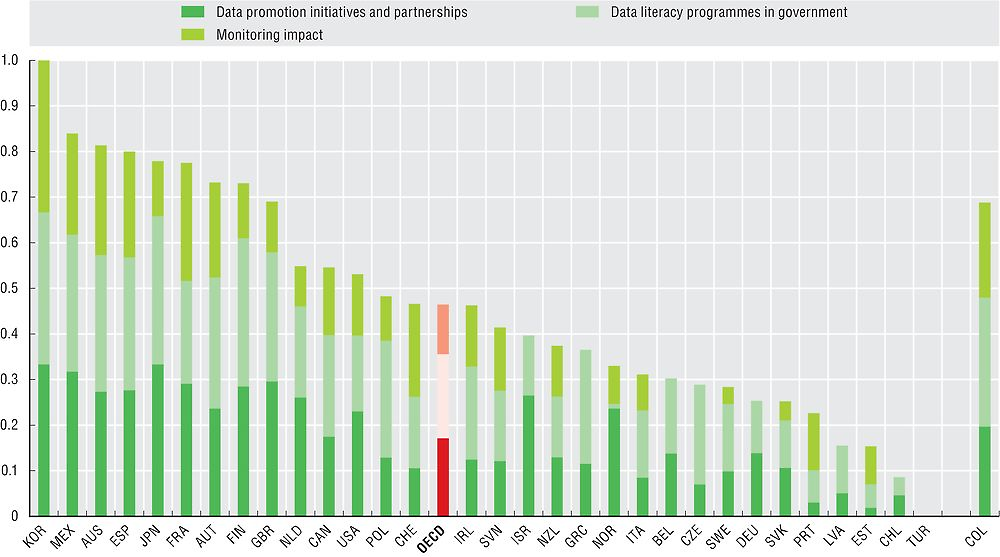Open Government Data
Open government data (OGD) can be a powerful lever for social and economic development. It can also be used to strenghten public governance by improving the design of public services with a citizen-driven approach, by enhancing public sector efficiency and by spurring public sector integrity and accountability.. By ensuring OGD availability, accessibility and reuse by public, private and civic actors, governments can design more evidence-based and inclusive policies, stimulate innovation inside and outside the public sector, and empower citizens to take better-informed personal decisions.
Recognizing the benefits of OGD, a number of international instruments have been adopted over the past five years to encourage the adoption of policies that promote access to government data. For instance, the G8 Open Data Charter was adopted in 2013 followed by the International Open Data Charter (IODC) in 2015, and the G20 Anti-corruption Open Data Principles, also adopted in 2015.
The OECD OURdata Index (Open-Useful-Reusable data Index) is one of the tools (together with national OGD policy reviews and analytical work) developed by the OECD to support member countries in their effort to promote OGD. It aims to summarise some of the relative strengths and weaknesses of countries on a selected set of indicators and to help identify potential areas for actions. It measures the level of implementation of the IODC principles at the Central/federal level based on a framework developed by the OECD.
Three key findings come out from the 2017 edition of the OECD OURdata Index.
Firstly, governments have made important efforts to support the provision of a large quantity of data in an open, free and accessible format but further efforts could be made to pro actively support their re-use. Most countries have for instance adopted an “open by default” policy whereby all government data should be open unless there are legitimate justifications for not doing so. However, at the Central/federal level, the extent to which countries conduct initiatives to promote data re-use outside government (such as hackhatons and co-creation events) and inside governments (via training and information sessions to civil servants) varies greatly. Moreover few countries monitor the economic and social impact of open data as well as the impact of open data on public sector performance.
Secondly, data collected by the OECD suggests that there might be an implementation gap in a number of countries where policy developments have been introduced very recently including notably in some of the Eastern European countries such as the Czech Republic, Latvia, the Slovak Republic and Slovenia. By contrast, Korea, France, Great-Britain and the United-States, which were among the early adopters of OGD, have been able to introduce and implement a large range of policies to promote data availability, accessibility and re-use.
Thirdly, in the majority of OECD countries, stakeholders are regularly consulted by line Ministries and agencies to identify the types of datasets that users need but few countries have developed a Central/federal data portal conceived as an exchange, collaboration and crowdsourcing platform where users are empowered to submit data and provide feedback on the quality and limitations of the data for continuous improvement. Empowering users and supporting platforms of exchange among businesses, civil society organisations and government organisations is key for promoting greater re-use and impact of data and is an important component of the IODC principles.
The data come from the OECD Survey on Open Government Data conducted in November and December 2016. Survey respondents were predominantly chief information officers in OECD countries. Responses represent countries’ own assessments of current practices and procedures regarding open government data. Data refer only to Central/federal governments and exclude OGD practices at the state/local levels. Due to changes in the underlying framework (from the G8 Open data charter to the IODC) and therefore data the 2017 edition is not comparable to the 2014 edition.
The composite index is based on the International Open Data Charter principles and on the methodology described in OECD work (Ubaldi, 2013). The OECD OURdata Index contains 140 data points. For more information on the methodology and underlying data please see the annex online.
Further readings
OECD (2017) G20 Compendium on the use of open data for anti-corruption across G20 countries (forthcoming)
OECD (2016), Open Government Data Review of Mexico: Data Reuse for Public Sector Impact and Innovation, OECD Publishing, Paris. DOI: https://doi.org/10.1787/9789264259270-en
Ubaldi, B. (2013), “Open Government Data: Towards Empirical Analysis of Open Government Data Initiatives”, OECD Working Papers on Public Governance, No. 22, OECD, Paris, https://doi.org/10.1787/5k46bj4f03s7-en.
Figure notes
Data for Hungary, Iceland and Luxembourg are not available. Denmark does not have a Central/federal data portal and therefore are not displayed in the Index.
Detailed methodology and underlying data available online in the annex online.
Information on data for Israel: https://doi.org/10.1787/888932315602.


